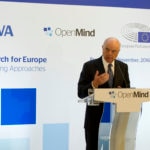Francisco González presents the book 'The Search for Europe' at the European Parliament
BBVA Group Executive Chairman Francisco González presented the book 'The Search for Europe' at the European Parliament. The book includes the perspectives of 23 prestigious authors on the present and future of Europe and its integration process – a process that deeply affects the lives of Europeans and everyone around the world.

Members of the European Parliament Sylvie Goulard, Jonás Fernández and Pablo Zalba joined the BBVA Global Executive Chairman in the presentation, analyzing the difficulties the EU is facing to restore economic growth and the opportunities the digital economy offers to do so.
Two of the authors of the book, Alberto Alesina, Professor of Political Economy at Harvard University; and Martin Raiser, Country Director of the World Bank in Brazil, also presented their theses regarding the causes of the eurozone crisis.
'The Search for Europe; Contrasting Approaches' is the eighth volume in the annual series of books published by BBVA, which explore decisive issues of our time. This collection is part of the OpenMind project, a digital knowledge community that offers free access to books, other articles, interviews, videos and infographics for a growing audience. “The Search for Europe” can be downloaded for free in Spanish and English in different electronic formats.

From left to right, Alberto Alesina, professor at Harvard University, Francisco González, BBVA Group Executive Chairman, and Martin Raiser, Director of the World Bank for Brazil, during the presentation of the book "The Search for Europe" held today at the European Parliament.
During the presentation, Francisco González noted that nearly 200 authors from around the world are participating in this collaborative platform set up by BBVA “to help people understand the forces that are shaping our world.”
Francisco González started his presentation by recognizing the serious problems the EU is facing. “The U.K.’s Brexit decision marks a turning point for the European Union. And the only way out of these problems is to continue to press forward,” said Francisco González. In his opinion, “maintaining the status quo will only exasperate problems. And moving backwards is unthinkable. It would lead the member countries to a deep, lasting recession and condemn Europe to irrelevance in a complex and conflictive global context.”
"The U.K.’s Brexit decision marks a turning point for the European Union
But pushing for more political integration in the current scenario is not easy. Francisco González feels that the best strategy is to “give maximum priority to growth in order to gradually improve the social and political climate in the European Union.”
Francisco González considers that we cannot rely on monetary policy to stimulate growth: “The ECB has already reached its limits. Their contribution has been very positive to avoid a more severe recession… However, there is no room for maneuver to further reduce interest rates as this could prove counterproductive.”
"We need reforms in educational policies to help people adapt to and thrive in the new economy of the digital age
BBVA's Group Executive Chairman believes that “any available margins to increase spending should be used to improve productivity and advance adaptation to the technological revolution. This means more investment in infrastructures – both physical and digital – in promoting R+D and innovation; and in education. In this respect, education must also be prioritized. We must not only spend more, but also spend better. We need reforms in educational policies to help people adapt to and thrive in the new economy of the digital age.”
Francisco González also urged the Members of European Parliament to pass “structural reforms that improve flexibility in markets, facilitating the creation of enterprises, combating monopolies and encouraging research, development and innovation.”
Martin Raiser attributed the eurozone crisis to the lack of real convergence, poor management of Greece’s problems and European leaders’ failure to sever governments and banks. He is optimistic regarding the effectiveness of the European economic model, insisting that it should be improved, not discarded.
The Country Director of the World Bank in Brazil also stressed that the European countries that have done the best since the crisis are those that have most effectively taken advantage of the economic integration, and have addressed their weaknesses in the organization of work and welfare in particular.
Alberto Alesina focused on the level of confidence among citizens – a fundamental aspect that favors economic and financial transactions. Without it, we need regulation to avoid uncooperative behavior, fraud and breach of contracts. Without confidence, courts are overwhelmed and public policy becomes unviable, says Alesina.
The recent crisis in Greece lowered European’s confidence, especially along the North-South axis. As a result, this Harvard University Professor warned that it will be more difficult to implement the regulatory reforms the eurozone needs, such as a more integrated fiscal policy, a common unemployment legislation across Europe and a banking union.